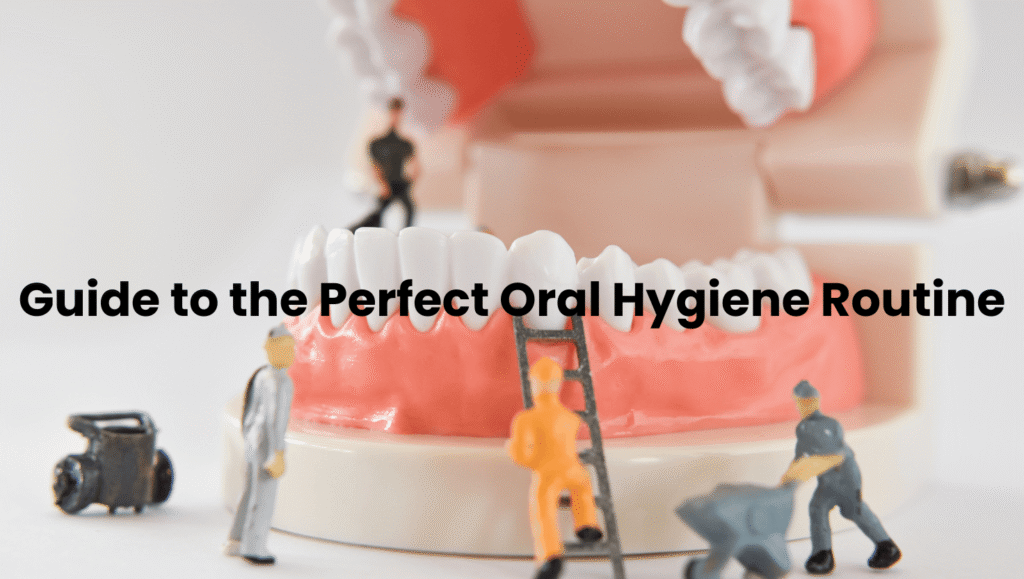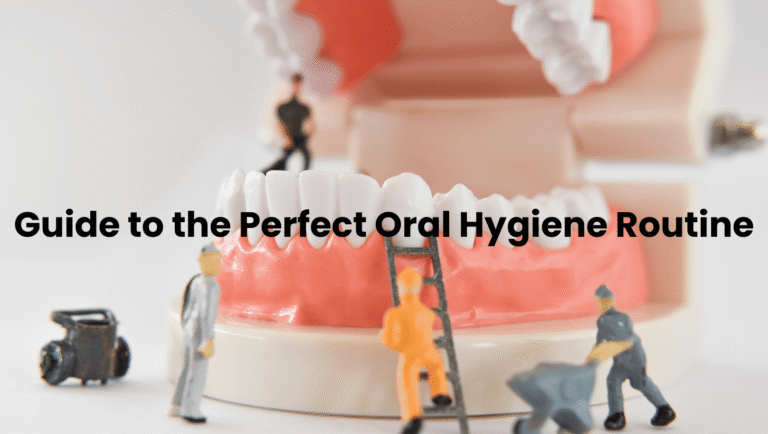1. Introduction
Why an Oral Hygiene Routine Matters for Your Health
Maintaining a consistent oral hygiene routine is crucial not only for a bright smile but also for your overall health. Neglecting oral care can lead to dental issues like tooth decay and gum disease, which, if left untreated, may contribute to more serious health problems. For instance, there is a connection between inadequate oral hygiene and an elevated risk of heart disease, stroke, and diabetes.
Bacteria from the mouth can enter the bloodstream, causing inflammation and potentially affecting other organs.
How Good Oral Hygiene Impacts Overall Wellness
Beyond preventing dental problems, good oral hygiene plays a significant role in maintaining overall wellness. Regular brushing and flossing help remove harmful bacteria, reducing the risk of infections that can affect the entire body. Additionally, a healthy mouth contributes to better digestion, improved self-esteem, and even a reduced risk of certain cancers . By investing in your oral health, you’re also investing in your general well-being.
2. Understanding Oral Health
What is Oral Health?
Oral health means more than just having clean teeth. It refers to the overall condition of your mouth, including your teeth, gums, tongue, and the tissues that support them. Good oral health means you’re free from problems like tooth decay, gum disease, and bad breath, allowing you to eat, speak, and smile confidently. Maintaining oral health is important because problems in the mouth can affect other parts of your body too, making it essential to care for your mouth every day. (Source: World Health Organization)
The Role of the Oral Microbiome in Maintaining a Healthy Mouth
Your mouth is home to a complex community of bacteria and microorganisms known as the oral microbiome. Not all bacteria are harmful—many help protect your teeth and gums by keeping a healthy balance. When the oral microbiome is balanced, it helps prevent the growth of harmful bacteria that cause issues like cavities and gum disease. But when this balance is disrupted, harmful bacteria can take over, leading to oral health problems. Supporting your oral microbiome through good hygiene and, sometimes, probiotics can help keep your mouth healthy and balanced. (Source: National Institutes of Health)
3. Common Oral Health Problems
Causes of Tooth Decay:
- Poor Oral Hygiene: Not brushing and flossing regularly allows dental plaque—a sticky film of bacteria—to build up on your teeth. These bacteria produce acids that attack tooth enamel.
- Sugary and Acidic Foods: Consuming lots of sugary snacks and drinks or acidic foods fuels harmful bacteria that erode enamel and cause cavities.
- Dry Mouth: Reduced saliva means less natural cleaning and protection, making teeth more vulnerable to decay. Certain medications or conditions can cause dry mouth.
- Frequent Snacking: Eating or sipping sugary or acidic items frequently gives bacteria more opportunities to produce damaging acids.
- Not Visiting the Dentist Regularly: Without routine dental exams, early signs of decay can be missed, allowing cavities to worsen.
How to Prevent Tooth Decay:
- Brush your teeth twice a day with fluoride toothpaste, using proper brushing techniques to achieve the best results.
- Floss daily to remove plaque and food stuck between teeth.
- Try to cut back on sugary and acidic foods and drinks, and be sure to rinse your mouth with water afterward to help protect your teeth.
- Stay hydrated to promote saliva production.
- Visit your dentist regularly for check-ups and professional cleanings.
- Consider chewing sugar-free gum to help neutralize acids and boost saliva flow.
Recognizing Early Signs of Gum Disease and Bleeding Gums
Gum disease often starts quietly, but spotting the early signs can help you take action before it gets worse. Common symptoms include gums that bleed easily during brushing or flossing, redness or swelling around the gum line, and tenderness or discomfort. You might also notice persistent bad breath or gums that feel sore.If gum disease isn’t treated early, it can worsen and lead to serious issues like loose teeth or even losing them altogether. Regularly checking your gums and visiting your dentist can help catch these signs early and keep your gums healthy.
Other Oral Health Problems: Dry Mouth, Loose Teeth, and Oral Cancer
Dry Mouth happens when your mouth doesn’t produce enough saliva, which is important for washing away food and neutralizing acids. It can make your mouth feel sticky or sore and increase your risk for tooth decay and infections. Certain medications and health conditions can cause dry mouth, so staying hydrated and talking to your dentist can help.
Loose Teeth aren’t normal and usually signal advanced gum disease or other issues like injury. If your teeth feel wobbly or shifting, it’s important to see a dental professional quickly to prevent tooth loss.
Oral Cancer is a serious condition that can affect your lips, tongue, cheeks, and throat. Early signs include persistent sores, lumps, or patches in your mouth. Regular dental exams are crucial because dentists can spot early warning signs and help with prompt treatment.
4. The Basics of a Good Oral Hygiene Routine
Brushing your teeth twice a day is key to keeping your mouth healthy and preventing problems like tooth decay and gum disease. Doing it once in the morning and once before bed helps remove the plaque and food particles that build up throughout the day and night. This routine supports strong tooth enamel and fresh breath, making it one of the easiest ways to maintain good oral hygiene and protect your smile.
Choosing the right toothbrush makes a big difference in your oral care. A soft-bristled toothbrush is gentle on your gums but effective at removing plaque without causing irritation or damage. Make sure the brush head is the right size to comfortably fit your mouth—small enough to reach all areas, including the back teeth and along the gum line. Whether you prefer a manual or electric toothbrush, picking one that feels comfortable encourages you to brush properly and consistently.
Using fluoride toothpaste is essential for protecting your teeth from tooth decay. Fluoride works by strengthening your tooth enamel, helping it better resist the acids that harmful bacteria in your mouth produce. Drinking fluoridated water adds another layer of protection by continuously supplying low levels of fluoride to your mouth throughout the day. Together, they play a key role in preventing cavities and keeping your smile healthy and strong.
5. Tooth Brushing Techniques for Healthy Teeth
Brushing your teeth properly means more than just moving the brush around. Hold your toothbrush with your middle finger resting gently on the handle—this gives you better control and a lighter touch to protect your gums. Use small circular motions rather than harsh back-and-forth scrubbing to effectively remove plaque along the gum line and tooth surfaces. Taking your time and being gentle helps keep your teeth clean without damaging your gums or enamel.
Cleaning along the gum line is one of the most important parts of your oral hygiene routine because that’s where dental plaque tends to build up and cause problems like gum disease and tooth decay. When you brush, angle your toothbrush bristles slightly toward your gums and use gentle, circular motions to remove dental plaque without irritating the delicate gum tissue. Paying extra attention to this area helps keep your gums healthy and prevents plaque from hardening into tartar, which can only be removed by a dental professional.
Saliva plays a surprisingly important role in keeping your teeth healthy. It helps wash away food particles and neutralizes acids produced by harmful bacteria that can wear down your tooth enamel. Saliva also provides minerals that help repair early damage to enamel, making it a natural protector against tooth decay. Staying hydrated and chewing sugar-free gum can help boost saliva production, which supports a healthier mouth overall.
6. Flossing and Other Tools for Effective Cleaning
Why Dental Floss is Essential to Remove Food Particles Between Teeth
Dental floss is a simple yet powerful tool that helps clean the tight spaces between your teeth where a toothbrush can’t reach. By removing trapped food particles and dental plaque, flossing helps prevent gum disease, tooth decay, and bleeding gums. Making flossing a daily habit keeps your mouth cleaner and supports overall oral hygiene.
How to Use Interdental Brushes and Water Flossers
If flossing isn’t your favorite, interdental brushes and water flossers offer easy alternatives to clean between teeth and along the gum line. Interdental brushes gently scrub away plaque in spaces between teeth, while water flossers use a targeted stream of water to flush out food debris and bacteria. Both tools are especially helpful for people with braces, implants, or tight spaces, making oral care more effective and comfortable.
Benefits of Sugar-Free Gum for Oral Hygiene
Chewing sugar-free gum is more than just a quick breath freshener—it actually helps boost saliva production, which is vital for neutralizing harmful acids in the mouth. This extra saliva washes away food particles and supports the natural repair of tooth enamel, reducing the risk of cavities and tooth decay. It’s a handy addition to your oral hygiene routine, especially when brushing or flossing isn’t immediately possible.
7. Foods and Drinks That Affect Your Oral Health
Acidic foods like citrus fruits and sugary drinks like soda and energy drinks can erode your tooth enamel, leaving your teeth more prone to decay. The sugar feeds harmful oral bacteria, which produce acids that attack your teeth even further. Regularly consuming these can lead to cavities and sensitivity if you’re not careful with your oral hygiene.
Drinking plenty of water throughout the day helps wash away food particles and neutralize the acids in your mouth caused by eating or drinking acidic and sugary items. Water also supports healthy saliva production, which is your mouth’s natural defense against decay. Carry a water bottle and sip often, especially after meals or snacks, to keep your mouth fresh and protected.
Tobacco products not only stain your teeth but also harm your gums and increase your risk of gum disease, oral cancer, and other serious health problems. Smoking or chewing tobacco reduces saliva flow, which is vital for maintaining a healthy mouth, and makes it harder for your body to fight infections. Quitting tobacco is one of the best steps you can take for a healthier smile and overall wellness.
8. Regular Dental Visits: What to Expect
Why Routine Dental Exams Are Crucial for Preventing Oral Disease
Routine dental exams are essential because they allow your dentist to catch early signs of oral disease like gum disease and tooth decay before they become serious. Regular check-ups help remove stubborn dental plaque and tartar that you can’t get rid of with brushing alone, reducing your risk of tooth loss and other complications.
How Often Should You See a Dental Professional?
Most dental professionals recommend visiting your dentist every six months for a routine exam and cleaning. However, if you have certain health conditions or a history of oral problems, your dentist might suggest more frequent visits. Regular appointments help maintain your oral health and keep your smile in top shape.
What Happens During a Dental Exam and Cleaning?
During your dental exam, the dentist or hygienist will check your teeth, gums, and mouth for any signs of problems. They’ll clean your teeth by removing plaque and tartar buildup, polish them, and may take X-rays if needed. You’ll also get personalized advice on improving your oral hygiene routine to keep your teeth and gums healthy between visits.
9. Special Considerations
Oral Hygiene Tips for Pregnant Women to Reduce Risk of Low Birth Weight
Pregnancy brings many changes to the body, including the mouth, making good oral hygiene especially important for expectant mothers. Hormonal shifts can increase the risk of gum disease, which studies have linked to premature birth and low birth weight. Brushing twice daily with fluoride toothpaste, flossing regularly, and visiting the dentist for cleanings can help keep gums healthy and reduce these risks. Pregnant women should always inform their dental professional about their pregnancy for safe care.
Managing Oral Health with Existing Health Conditions Like Heart Disease and Diabetes
If you have health conditions such as heart disease or diabetes, maintaining good oral health becomes even more crucial. These conditions can increase your vulnerability to infections, including gum disease, which can, in turn, worsen your overall health. Regular dental check-ups, diligent brushing and flossing, and working closely with your healthcare providers can help manage your oral health and support your general well-being.
How Oral Health Helps Reduce Risk of Serious Health Problems
Your mouth can be a window to your overall health. Poor oral hygiene and infections like gum disease have been linked to serious health problems, including heart disease, stroke, and respiratory infections. Keeping your teeth and gums healthy through a solid oral hygiene routine and regular dental visits helps reduce inflammation and the spread of harmful bacteria, lowering your risk of these conditions and contributing to better overall health.
10. Helpful Tips to Maintain Good Oral Health
Practice Good Oral Hygiene Habits Every Day
Consistency is key when it comes to oral health. Brushing your teeth twice a day, flossing daily, and using fluoride toothpaste are simple habits that protect your teeth and gums from decay and disease. Making these habits part of your daily routine helps keep your smile bright and reduces the risk of oral health problems like tooth decay and bleeding gums.
Keeping your mouth healthy goes beyond just brushing and flossing. Simple habits like staying hydrated, eating a balanced diet, and avoiding tobacco products make a big difference. Another great way to support your oral health is by adding a high-quality probiotic supplement like ProDentim to your daily routine. ProDentim contains powerful probiotic strains that help balance the bacteria in your mouth, promote healthier gums, and freshen breath naturally. You can learn more about how ProDentim works and get yours here.
Using Mouthwash: When and How It Helps
Mouthwash can be a helpful addition to your oral hygiene routine, especially for reaching areas that brushing and flossing might miss. It helps reduce oral bacteria, freshen breath, and can provide extra protection against gum disease. However, it’s important to choose the right mouthwash for your needs and use it as directed—typically after brushing and flossing—to maximize benefits without irritating your mouth.
Avoiding Common Mistakes That Damage Your Teeth and Gums
Some everyday habits can unintentionally harm your teeth and gums. Brushing too hard or using a hard-bristled toothbrush can wear down tooth enamel and irritate your gums. Frequent snacking on sugary or acidic foods, neglecting flossing, and smoking are other common mistakes that increase the risk of decay and gum disease. Being mindful of these habits helps protect your oral health long-term.
11. Conclusion
Maintaining a consistent oral hygiene routine is one of the best ways to protect your teeth, gums, and overall health. Simple daily habits like brushing twice a day, flossing, and using fluoride toothpaste can make a big difference in preventing common problems such as tooth decay and gum disease. Pairing this routine with regular visits to your dentist ensures early detection and professional care to keep your smile healthy for life.
Remember, taking care of your mouth isn’t just about appearance—it’s about your whole body’s well-being. Start building these healthy habits today, and don’t forget to schedule your next dental appointment. Your smile—and your health—will thank you!




